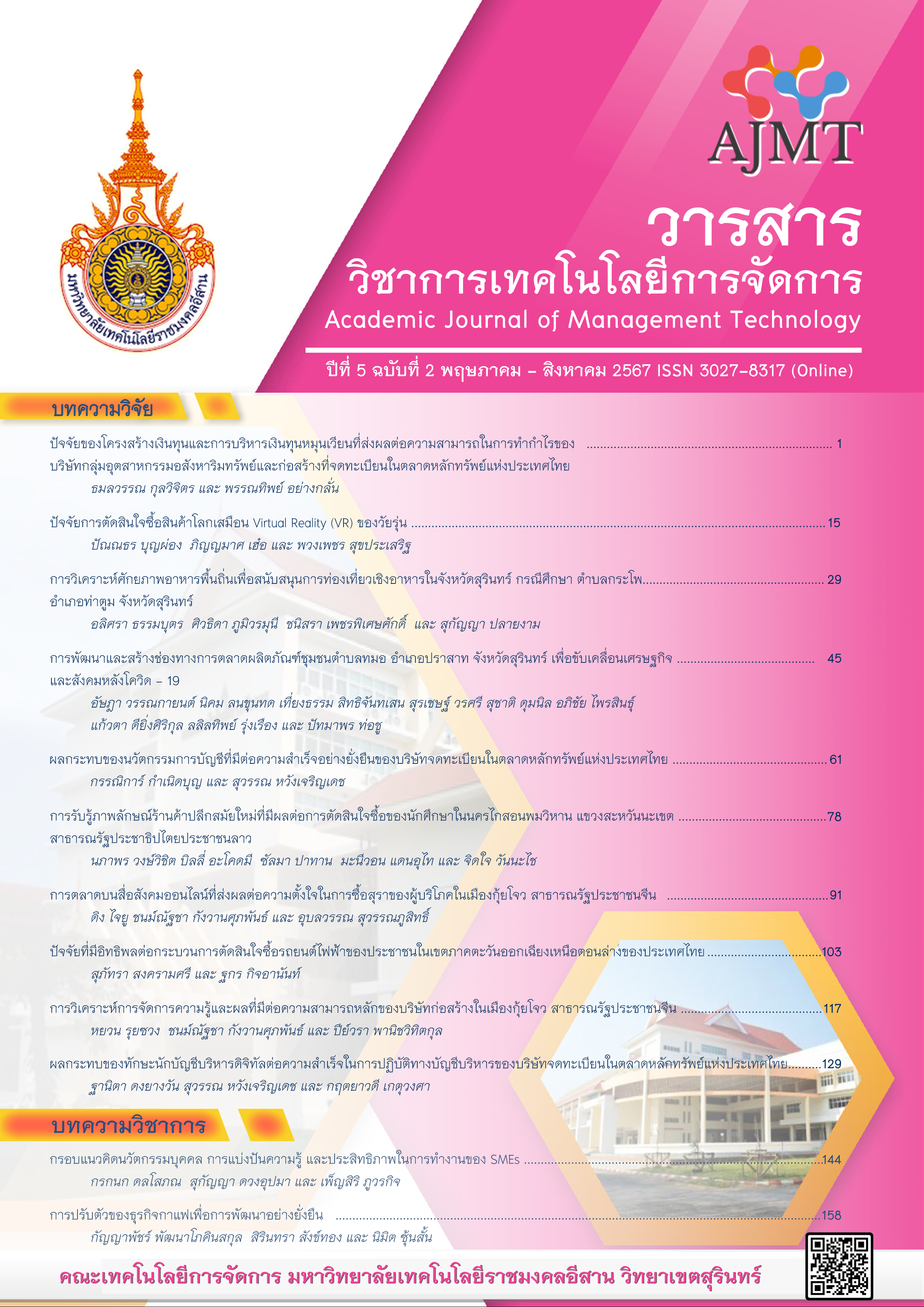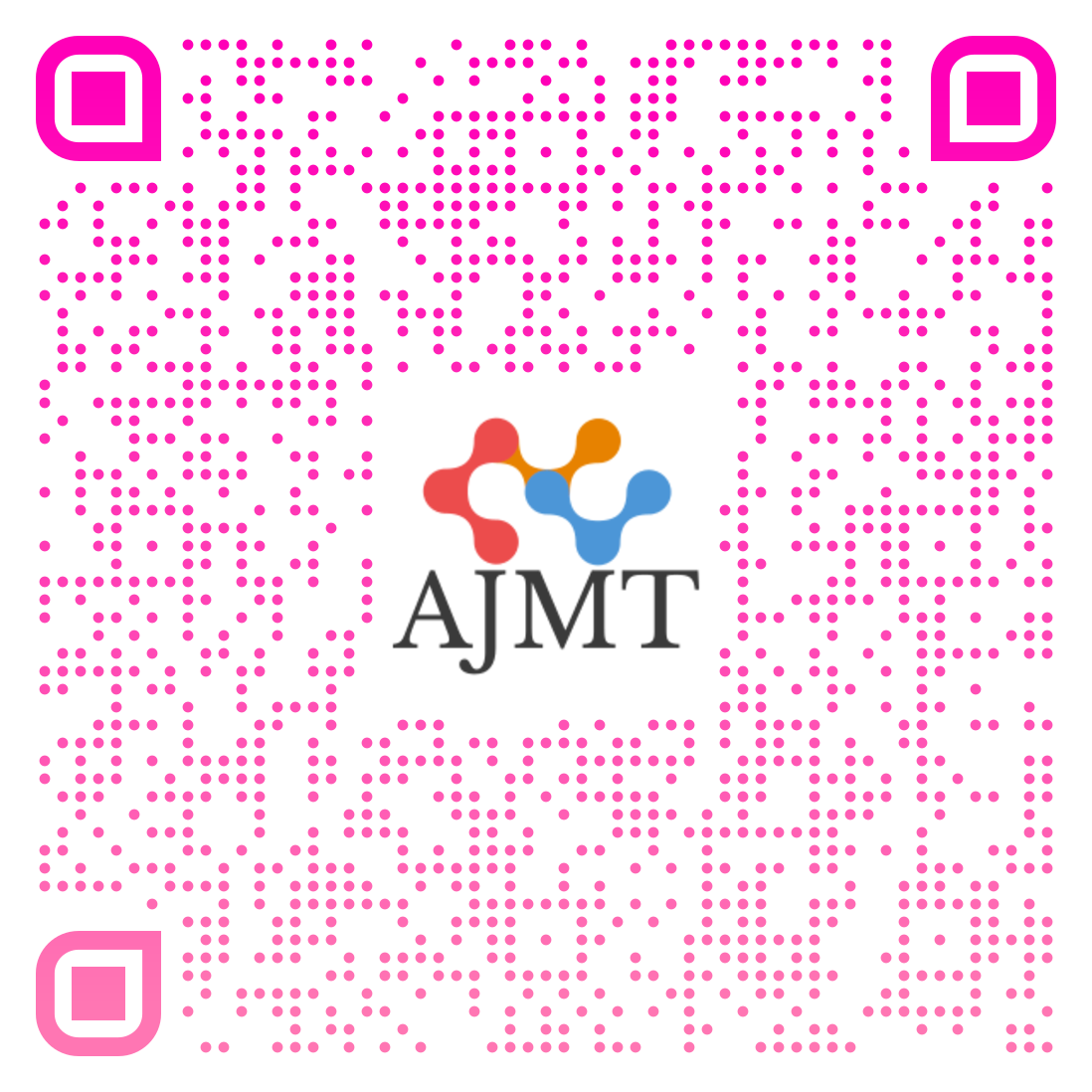กรอบแนวคิดนวัตกรรมบุคคล การแบ่งปันความรู้ และประสิทธิภาพ ในการทำงานของ SMEs
DOI:
https://doi.org/10.14456/ajmt.2024.20คำสำคัญ:
การแบ่งปันความรู้, นวัตกรรมบุคคล, ประสิทธิภาพการทำงานบทคัดย่อ
ปัจจุบันสภาพแวดล้อมที่มีการเปลี่ยนแปลงไปอย่างไม่หยุดนิ่งทำให้ธุรกิจต้องปรับตัวให้เกิดการร่วมสมัย นวัตกรรมบุคคลและการแบ่งปันความรู้ มีบทบาทสำคัญในการยกระดับประสิทธิภาพของวิสาหกิจขนาดกลางและ ขนาดย่อม (SMEs) การสร้างกรอบแนวคิดที่ครอบคลุมซึ่งสังเคราะห์วรรณกรรมทางวิชาการที่มีอยู่เพื่ออธิบายความสัมพันธ์ที่ซับซ้อนระหว่างนวัตกรรมบุคคล การแบ่งปันความรู้ และประสิทธิภาพในการทำงาน กรอบงานระบุ สามมิติที่เชื่อมโยงกัน 1) นวัตกรรมบุคคล คือ ลักษณะส่วนบุคคล การเตรียมพร้อมสู่อนาคตและโอกาสใหม่ การคิดสร้างสรรค์ ทักษะทางสังคม เครือข่ายและเทคโนโลยีสุดท้ายคือ ความรู้และวิชาชีพ 2) การแบ่งปันความรู้คือการแลกเปลี่ยนเรียนรู้ การสกัดความรู้ออกจากตัว การรวบรวมความรู้ และการผนึกฝังความรู้ และ 3) ประสิทธิภาพการทำงาน ทั้งปริมาณ คุณภาพ และเวลา ถือเป็นสิ่งสำคัญอันยิ่งใหญ่สำหรับการตรวจสอบเชิงประจักษ์ เพื่อนำไปประยุกต์ใช้ในบริบทของ SMEs ไทยไม่เพียงแต่ตอบสนองวัตถุประสงค์ของการวิจัยในทันทีเท่านั้น แต่ยังเป็นรากฐาน ที่มั่นคงสำหรับการศึกษาในอนาคต ซึ่งจะมีส่วนร่วมในการทำความเข้าใจที่ลึกซึ้งยิ่งขึ้นเกี่ยวกับกลยุทธ์การจัดการ SMEs ผู้ประกอบการสามารถใช้ประโยชน์จาก นวัตกรรมบุคคลเพื่อเพิ่มประสิทธิภาพในการทำงาน ซึ่งการแบ่งปันความรู้ จะช่วยกำกับให้เกิดประสิทธิภาพ และท้ายที่สุดสร้างความสำเร็จและได้เปรียบในการแข่งขันต่อไป
เอกสารอ้างอิง
Alerasoul, S. A., Afeltra, G., Hakala, H., Minelli, E., & Strozzi, F. (2022). Organisational learning, learning organisation, and learning orientation: An integrative review and framework. Human Resource Management Review, 32(3), Article 100854. https://doi.org/10.1016/j.hrmr.2021.100854
Al-Hawari, M. A., Bani-Melhem, S., & Shamsudin, F. M. (2019). Determinants of frontline employee service innovative behavior. Management Research Review, 42(9), 1076-1094. https://doi.org/10.1108/MRR-09-2017-0345
Ahmed, S., Ahmed, A., & Ahmad, M. (2017). Application of multiple comparison procedures on an individual’s innovative behavior. Pakistan Journal of Statistics, 33(3), 191-206.
Ahmad, N., Ahuja, S. D., Akkerman, O. W., Alffenaar, J. W. C., Anderson, L. F., Baghaei, P., & Menzies, D. (2018). Treatment correlates of successful outcomes in pulmonary multidrug-resistant tuberculosis: an individual patient data meta-analysis. The Lancet, 392(10150), 821-834. https://doi.org/10.1016/S0140-6736(18)31644-1
Ammirato, S., Linzalone, R., & Felicetti, A. M. (2021). Knowledge management in pandemics: A critical literature review. Knowledge Management Research & Practice, 19(4), 415-426. https://doi.org/10.1080/ 14778238.2020.1810762
Asemahagn, M. A. (2014). Knowledge and experience sharing practices among health professionals in hospitals under the Addis Ababa health bureau, Ethiopia. BMC Health Services Research, 14, 431. https://doi.org/10.1186/1472-6963-14-431
Avvisati, F., Jacotin, G., & Vincent-Lancrin, S. (2013). Educating higher education students for innovative economies: What international data tells us. Tuning Journal for Higher Education, 1(1), 223-240. https://doi.org/10.18543/tjhe-1(1)-2013pp223-240
Ayanbode, O. F. (2020). Collaborative technologies and knowledge management in psychiatric hospitals in South West Nigeria. Information Development, 36(1), 1-22. https://doi.org/10.1177/0266666919865782
Barari, R. (2015). The effect role of knowledge management on organizational innovation in the university of Iran. International Journal of Educational and Psychological Researches, 1(2), 87-95.
Bari, B. A., Grossman, C. D., Lubin, E. E., Rajagopalan, A. E., Cressy, J. I., & Cohen, J. Y. (2019). Stable representations of decision variables for flexible behavior. Neuron, 103(5), 922-933. https://doi.org/10.1016/j.neuron.2019.05.046
Bari, M. W., Ghaffar, M., & Ahmad, B. (2020). Knowledge-hiding behaviors and employees’ silence: Mediating role of psychological contract breach. Journal of Knowledge Management, 24(9), 2171-2194. https://doi.org/10.1108/JKM-11-2019-0612
Berraies, S., Achour, M., & Chaher, M. (2015). Focusing the mediating role of knowledge management practices: How does institutional and interpersonal trust support exploitative and exploratory innovation?. Journal of Applied Business Research , 31(4), 1479-1492.
Blichfeldt, H. & Faullant, R. (2021). Performance effects of digital technology adoption and product & service innovation–A process-industry perspective. Technovation, 105, Article 102275. https://doi.org/10.1016/ j.technovation.2020.102275
Boroujerdi, S. S., Hasani, K., & Delshab, V. (2019). Investigating the influence of knowledge management on organizational innovation in higher educational institutions. Kybernetes, 49(2), 442-459. https://doi.org/ 10.1108/K-05-2018-0254
Borrero, J. D., Yousaf, A., Javed, U., & Farooq, Q. (2020). Relationship between e-learning motivation,
e-satisfaction, e-trust, e-service quality, and e-loyalty of online learners. Behaviour & Information Technology, 39(10), 1275-1292. https://doi.org/ 10.1080/0144929X.2020.1738566
Cajková, A., Jankelová, N., & Masár, D. (2023). Knowledge management as a tool for increasing the efficiency of municipality management in Slovakia. Knowledge Management Research & Practice, 21(2), 292-302.
Castela, B. M. S., Ferreira, F. A. F., Ferreira, J. J. M., & Marques, C. S. E. (2018). Assessing the innovation capability of small- and medium-sized enterprises using a non-parametric and integrative approach. Management Decision, 56(6), 1365-1383.
Cobo, C. & Moravec, J. (2013). Mechanisms to identify and study the demand for innovation skills in world-renowned organizations. On the Horizon, 21(2), 96-106.
Edwards-Schachter, M., García-Granero, A., Sánchez-Barrioluengo, M., Quesada-Pineda, H., & Amara, N. (2015). Disentangling competences: Interrelationships on creativity, innovation, and entrepreneurship. Thinking Skills and Creativity, 16, 27-39.
Evans, J. M., Brown, A., & Baker, G. R. (2015). Intellectual capital in the healthcare sector: A systematic review and critique of the literature. BMC Health Services Research, 15, 1-14. https://doi.org/10.1186/s12913-015-1101-6
Feiz, D., Dehghani, S. M., & Farsizadeh, H. (2017). The effect of knowledge sharing on the psychological empowerment in higher education mediated by organizational memory. Studies in Higher Education, 44(1), 1-17.
Ferreira, J., Mueller, J., & Papa, A. (2020). Strategic knowledge management: Theory, practice, and future challenges. Journal of Knowledge Management, 24(2), 121-126.
Francischeto, L. L. & Neiva, E. R. (2019). Innovation in companies and cultural orientation to innovation: A multilevel study. RAM Revista de Administração Mackenzie, 20(3), 1-37.
Gang, K. & Ravichandran, T. (2015). Exploring the determinants of knowledge exchange in virtual communities. IEEE Transactions on Engineering Management, 62(1), 89-99.
Ghosh, K. (2015). Developing organizational creativity and innovation. Management Research Review, 38(11), 1126-1148.
Gomes, C., Curral, L., & Caetano, A. (2015). The Mediating Effect of Work Engagement on the Relationship between Self-Leadership and Individual Innovation. International Journal of Innovation Management, 19(1), 1550009. https://doi.org/10.1142/S1363919615500097
Hanifah, H., Abd Halim, N., Vafaei-Zadeh, A., & Nawaser, K. (2022). Effect of intellectual capital and entrepreneurial orientation on innovation performance of manufacturing SMEs: Mediating role of knowledge sharing. Journal of Intellectual Capital, 23(6), 1175-1198.
Hasani, K. & Sheikhesmaeili, S. (2016). Knowledge management and employee empowerment: A study of higher education institutions. Kybernetes, 45(2), 337-355.
Hero, L.-M., Lindfors, E., & Taatila, V. (2017). Individual Innovation Competence: A Systematic Review and Future Research Agenda. International Journal of Higher Education, 6(5), 103.
Ibus, S. b., & Ismail, F. b. (2018). Conceptual Framework: The Mediating Effect of Self-Efficacy in the Relationships of Self-Leadership, Knowledge Sharing, and Innovative Work Behaviour. International Journal of Academic Research in Business and Social Sciences, 8(11), 1859-1876.
Jabeen, Q., Nadeem, M. S., Raziq, M. M., & Sajjad, A. (2022). Linking individuals’ resources with (perceived) sustainable employability: Perspectives from conservation of resources and social information processing theory. International Journal of Management Reviews, 24(2), 233-254.
Jack, C., Anderson, D., & Connolly, N. (2014). Innovation and skills: implications for the agri-food sector. Agricultural and Food Sciences, Business Journal of Education and Training, 56(4), 271-286.
Julpisit, A. & Esichaikul, V. (2019). A collaborative system to improve knowledge sharing in scientific research projects. Information Development, 35(4), 624-638.
Jnaneswar, K. & Ranjit, G. (2020). Organisational justice and innovative behaviour: Is knowledge sharing a mediator?. Industrial and Commercial Training, 53(1), 77-91.
Keller, M. R. & Block, F. (2013). Explaining the transformation in the US innovation system: The impact of a small government program. Socio-Economic Review, 11(4), 629-656.
Koopmans, L., Bernaards, C. M., Hildebrandt, V. H., de Vet, H. C., & van der Beek, A. J. (2014). Measuring individual work performance: Identifying and selecting indicators. Work, 48(2), 229-238.
Lindfors, E. & Hilmola, A. (2015). Innovation learning in comprehensive education?. International Journal of Technology and Design Education, 26(3), 373-389.
Lin, H. (2014). The impact of socialization mechanisms and technological innovation capabilities on partnership quality and supply chain integration. Information Systems and e-Business Management, 12(2), 285-306.
Montani, F., Odoardi, C., & Battistelli, A. (2014). Individual and contextual determinants of innovative work behaviour: Proactive goal generation matters. Journal of Occupational and Organizational Psychology, 87(4), 645-670.
Muhisn, Z. A. A., Ahmad, M., Omar, M., & Muhisn, S. A. (2020). Knowledge internalization in e-learning management system. Telecommunication Computing Electronics and Control, 18(3), 1361-1367.
Nielsen, J. A. (2015). Assessment of innovation competency: A thematic analysis of upper secondary school teachers’ talk. The Journal of Educational Research, 108(4), 318-330.
Na-Nan, K., Chaiprasit, K., & Pukkeeree, P. (2018). Factor analysis-validated comprehensive employee job performance scale. International Journal of Quality & Reliability Management, 35(10), 2436-2449.
Nyborg, K. (2014). Do responsible employers attract responsible employees?. IZA World of Labour, 1 - 10.
Obotor, F., Okene, D. E., & Sogbaike, O. (2013). Towards implementation of knowledge management for effective health care delivery: A case study of DELSUTH, Oghara, Nigeria. International Journal of Scientific and Engineering Research, 4(12), 36-48.
Office of the National Economic and Social Development Council. (2022). Strategic Plan Year 2020-2022. https://www.nesdc.go.th/ewt_w3c/ewt_dl_link.php?nid=10393
Oliveira, M., Macada, A., & Curado, C. (2014). Adopting knowledge management mechanisms: Avidence from Portuguese organizations. Knowledge and Process Management, 21(4), 231-245.
Petsri, C. (2014). The follower characteristics and organizational climate influencing operational efficiency of employees: A case study of the information and communications technology business group. Suthiparithat, 28(85), 145-160.
Sa’adah, N. & Rijanti, T. (2022). The Role of Knowledge Sharing, Leader-Member Exchange (LMX) on Organizational Citizenship Behavior and Employee Performance: An Empirical Study on Public Health Center of Pati 1, Pati 2 and Trangkil in Central Java. International Journal of Social and Management Studies, 3(1), 112-131.
Santandreu‐Mascarell, C., Garzon, D., & Knorr, H. (2013). Entrepreneurial and innovative competences, are they the same? Management Decision, 51(5), 1084-1095.
Sawyer, R. K. (2014). The future of learning: Grounding educational innovation in the learning sciences. In Sawyer, R. K. (Ed.), The Cambridge Handbook of the Learning Sciences (2nd ed.) (pp. 726-746). Cambridge University Press.
Singh, N., Bamel, U., & Vohra, V. (2020). The mediating effect of meaningful work between human resource practices and innovative work behavior: a study of emerging market. Employee Relations: The International Journal, 43(2), 459-478.
Singh, S., Subrahmanyan, R., Shankar, N. U., Rao, M. S., Fialkov, A., Cohen, A., ... & Srivani, K. S. (2018). SARAS 2 Constraints on Global 21 cm Signals from the Epoch of Reionization. The Astrophysical Journal, 858(1), 54.
Siriyasub, Y. & Jadesadalug, V. (2022). The influence of working smart and work passion toward knowledge sharing among the officers of department of disaster prevention and mitigation by employing a self-efficacy as a mediator. Songklanakarin Journal of Management Sciences, 39(1), 106-135.
Standing, C., Jackson, D., Larsen, A. C., Suseno, Y., Fulford, R., & Gengatharen, D. (2016). Enhancing individual innovation in organisations: A review of the literature. International Journal of Innovation and Learning, 19(1), 44.
Steffen, M. O., Oliveira, M., & Balle, A. R. (2017). Knowledge sharing among companies in a science and technology park. Business Information Review, 34(2), 101-108.
Sun, H., Ali, Z., & Wei, L. (2022). The impact of management support on individual learning opportunity and creativity performance in Hong Kong manufacturing companies. Journal of Manufacturing Technology Management, 33(4), 696-716.
Suseno, Y., Standing, C., Gengatharen, D., & Nguyen, D. (2019). Innovative work behaviour in the public sector: The roles of task characteristics, social support, and proactivity. Australian Journal of Public Administration, 79(1), 41-59.
Tovmasyan, G. & Minasyan, D. (2020). The impact of motivation on work efficiency for both employers. Business Ethics and Leadership, 4(3), 25-35.
Tsai, M., Chang, H., Cheng, N., & Lien, C. (2013). Understanding IT professionals’ knowledge sharing intention through KMS: A social exchange perspective. Quality and Quantity, 47(5), 2739-2753.
Tugay, O. & Pekersen, A. (2022). Impact to culinary chefs’ individual innovativeness levels on service innovation performance. International Journal of Gastronomy and Food Science, 27(1), 100472.
Vila, L. E., Pérez, P. J., & Coll-Serrano, V. (2014). Innovation at the workplace: Do professional competencies matter?. Journal of Business Research, 67(5), 752-757.
Wang, X. (2013). Forming mechanisms and structures of a knowledge transfer network: Theoretical and simulation research. Journal of Knowledge Management, 17(2), 278-289.
Yasir, M., Majid, A., Yousaf, Z., Nassani, A. A., & Haffar, M. (2023). An integrative framework of innovative work behavior for employees in SMEs linking knowledge sharing, functional flexibility and psychological empowerment. European Journal of Innovation Management, 26(2), 289-308
ดาวน์โหลด
เผยแพร่แล้ว
รูปแบบการอ้างอิง
ฉบับ
ประเภทบทความ
สัญญาอนุญาต
ลิขสิทธิ์ (c) 2024 คณะเทคโนโลยีการจัดการ มหาวิทยาลัยเทคโนโลยีราชมงคลอีสาน วิทยาเขตสุรินทร์

อนุญาตภายใต้เงื่อนไข Creative Commons Attribution-NonCommercial-NoDerivatives 4.0 International License.
บทความที่ได้รับการตีพิมพ์เป็นลิขสิทธิ์ของคณะเทคโนโลยีการจัดการ มหาวิทยาลัยเทคโนโลยีราชมงคลอีสาน วิทยาเขตสุรินทร์
ข้อความที่ปรากฏในบทความแต่ละเรื่องในวารสารวิชาการเล่มนี้ เป็นความคิดเห็นส่วนตัวของผู้เขียนแต่ละท่านไม่เกี่ยวข้องกับคณะเทคโนโลยีการจัดการ มหาวิทยาลัยเทคโนโลยีราชมงคลอีสาน วิทยาเขตสุรินทร์ และคณาจารย์ท่านอื่นๆในมหาวิทยาลัยฯ แต่อย่างใด ความรับผิดชอบองค์ประกอบทั้งหมดของบทความแต่ละเรื่องเป็นของผู้เขียนแต่ละท่าน หากมีความผิดพลาดใดๆ ผู้เขียนแต่ละท่านจะรับผิดชอบบทความของตนเองแต่ผู้เดียว










